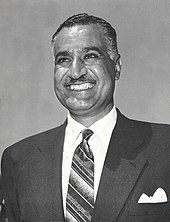Portal:1950s/Selected biography/5
Gamal Abdel Nasser Hussein (15 January 1918 – 28 September 1970) was an Egyptian military officer and politician who served as the second president of Egypt from 1954 until his death in 1970. Nasser led the Egyptian revolution of 1952 and introduced far-reaching land reforms the following year. Following a 1954 attempt on his life by a Muslim Brotherhood member, he cracked down on the organization, put President Mohamed Naguib under house arrest and assumed executive office. He was formally elected president in June 1956.
Nasser's popularity in Egypt and the Arab world skyrocketed after his nationalization of the Suez Canal Company and his political victory in the subsequent Suez Crisis, known in Egypt as the Tripartite Aggression. Calls for pan-Arab unity under his leadership increased, culminating with the formation of the United Arab Republic with Syria from 1958 to 1961. In 1962, Nasser began a series of major socialist measures and modernization reforms in Egypt. Despite setbacks to his pan-Arabist cause, by 1963 Nasser's supporters gained power in several Arab countries, but he became embroiled in the North Yemen Civil War, and eventually the much larger Arab Cold War. He began his second presidential term in March 1965 after his political opponents were banned from running. Following Egypt's defeat by Israel in the Six-Day War of 1967, Nasser resigned, but he returned to office after popular demonstrations called for his reinstatement. By 1968, Nasser had appointed himself prime minister, launched the War of Attrition to regain the Israeli-occupied Sinai Peninsula, begun a process of depoliticizing the military, and issued a set of political liberalization reforms. After the conclusion of the 1970 Arab League summit, Nasser suffered a heart attack and died. His funeral in Cairo drew five to six million mourners, and prompted an outpouring of grief across the Arab world. (Full article...)

